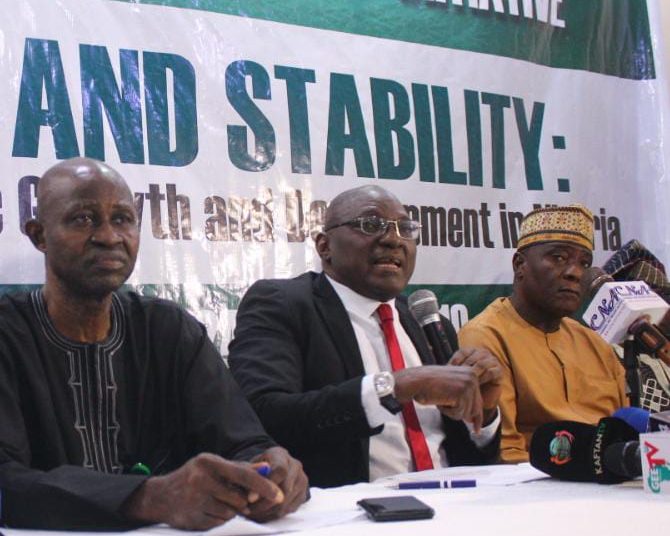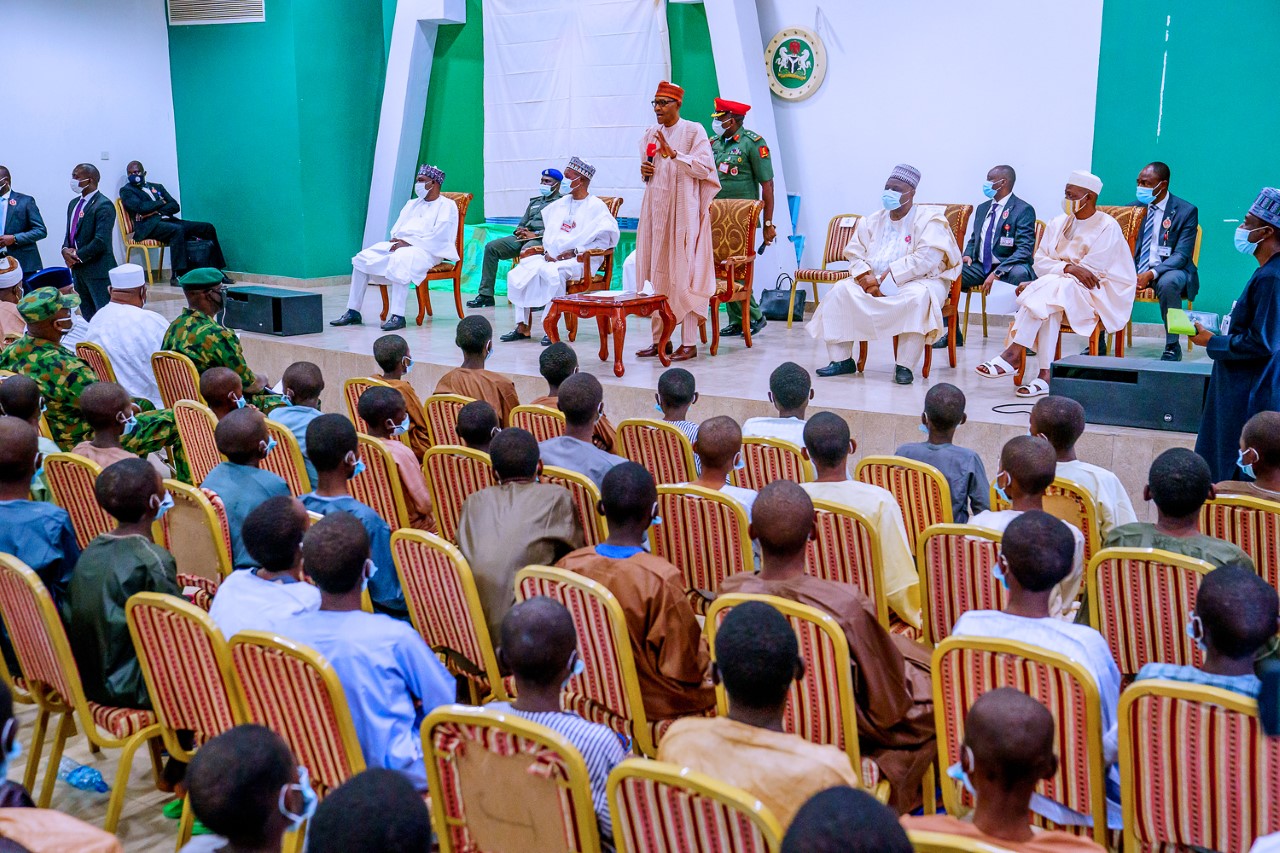The Independent Media and Policy Initiative (IMPI), a national Think Tank, has appealed to angry Nigerians to be patient with the ongoing economic reforms as no reform of the magnitude being undertaken can succeed without some forms of pains.
At a Press briefing on Tuesday in Abuja, the Chairman of IMPI, Chief Niyi Akinsiju, agreed that the aggregate impact of the reform on cost of goods and services truly reflects a disruption on the quality of life of the average Nigerian.
“We are, however, not unmindful of the President’s admonition at different times to the generality of Nigerians on the possible consequential impact of the reforms. We share in the president’s standpoint on this matter.
“We are well aware of Nigeria’s skyrocketing inflation figures, stated at 34.19 percent in June. This figure is primary driven by surging food prices which culminated in higher food inflation at figure of 40.87 percent in the month. The increase in inflation rates may have been aggravated by depreciation of the Nigerian currency on the harmonization of the foreign exchange windows and the removal of fuel subsidy. The two policies that now define the structural reformation of the economy.’’
He however explained that it was gratifying that the policies have begun to show initial capacity to redress the challenges they were conceived to address and noted the impressive reduction in the national debt profile which had fallen in dollar terms from 108 billion to 91 billion.
“What is obvious is that the wasteful regime of fuel subsidy contributed in no small measures to this huge debt accumulated over the years. Remarkably the government accomplished this feat under a 14-month period. Interestingly this impressive reduction in national debt profile now reflects in the hitherto worrisome debt-service to revenue ratio which has now dropped from 97% in the first half of 2023 to 68% in 2024.
“This is in addition to the N7.3 trillion Ways and Means obligation paid back by the federal government within a year of the administration. Even as the budget deficit had fallen from 6.1 percent to 4.4 percent currently, a clear indication of strategic fiscal management.
The healthy fiscal environment is apparently helped by the increase in quantum of crude oil production which had increased from 1.28 million barrel per day in April 2024 to 1.61 million barrels per day in July 23, 2024; the first time in 42 months.’’
He said that the improvement in the balance of the nation’s foreign reserves which increased from $32,29 billion in April 2024 to $37.05 billion in July 18, 2024, a remarkable increase by $2.35 billion in 18 days was another testimony worth celebrating.
Akinsiju also explained that there had been a noticeable improvement in electricity distribution especially with the quantum leap in generation and transmission.
“The sector recorded a number of interventions through policies and actions by the federal government. It was a remarkable feat when 700 megawatts of electricity was added to the national grid with the commissioning of the Zungeru Hydro- Electric Power Station in Niger State. In addition, the power sector also recorded the commissioning of two sub stations in Kebbi and Ajah in Lagos to consolidate the nation’s electricity distribution capacity. This has led to a considerable increase in power supply across the country.
We also commend the President for the payment of the historical N3.3 trillion debt owed the power sector, which for years, crippled the nation’s capacity to generate, transmit and distribute the required electricity power, that subjected the populace to the agony of endless outages.’’
He also explained that the federal government’s policy to democratize ownership and operation of the power sector to private entrepreneurs under the regulation of the sub-national governments.
“We have observed an evolving paradigm in the nation’s economic template.
The recent announcement of employment opportunity for 30,000 fellows that have graduated from cohort 1 of the ongoing 3 Million Technical Talents program under the Ministry of Communications, Innovation, and Digital Economy is indicative of an economy that is producing digital talents for both domestic and global engagement.`’’
He noted a number of measures designed to pep up mechanized farming to ensure food production and food security, including the distribution of 60,452 Metric Tons of improved seeds, 887,255 Metric Tons of seedlings, 138 value kits, 501,726 liters of agrochemicals, 62,328.5Metric Tons of inorganic fertilizers, 1,000kg fungicide, and 33,200 equipment to famers across different value chains to enhance agricultural production.
“This flurry of President Tinubu intervention in agricultural has, at the last count, successfully generated N309 billion into the economy in one year. This reflects an excellent performance.’’
He said that the recent waiver of import duties and tax on food importation will make food abundantly available and affordable, in addition to the $20 billion of foreign investments to revolutionize the agricultural sector in the bid to ensure food security and to reinvent Nigeria’s pride of place as the agricultural giant of Africa.
Besides, the creation of the Ministry of Livestock Development may have opened a new vista in concerted efforts to advance agriculture.
This initiative reveals the true intention of the President to harness Nigeria’s huge livestock potentials, and to find a lasting solution to the incessant Farmers-Herders clash as well as prop up the value chain that will create more employment opportunities.
On transportation, the reopening of Lagos – Kano railway line is another milestone in the effort by federal government to prosper the national economy.
In the education sector, the establishment of Nigerian Education Loan Fund (NELFUND) may indeed be the game-changer to facilitate access to education.
Impressively, within the short period of its establishment, applicants have started receiving credit for school fees and upkeep purposes. This is revolutionary, all Nigerians must applaud this.
The federal government only a few days ago opened the portal for a reinvigorated National Youth Investment Fund to be administered by the Ministry of Youth Development.
It was a N75 billion initiative for young business owners when former President Buhari introduced it in 2020, but the Tinubu administration has now expanded it by about 50 percent to N110 billion in order to accommodate more beneficiaries among the youth demography.
We note the pragmatic approach adopted by Tinubu administration to resolve the age-long contradiction inherent in the place of local government administration in the federal system. The President’s decision to approach the Supreme Court concerning the financial autonomy of the 774 Local Governments. This is an exemplar of wisdom and goodwill.
He welcomed the President’s intervention to give a lifeline to the $20 billion Dangote refinery and other refineries in sourcing crude oil for production, especially the waiver in buying crude oil in dollars.
Akinsiju noted with happiness the decision of the Federal Executive Council to approve the President’s policy to all oil drilling firms to sell crude oil to the refineries in Naira and also the directive to NNPCL to allocated 450,000 barrel per day to Dangote refinery.
He reasoned that this action would not only make refined petroleum products available, it could also reduce prices as well as save Nigeria $500 million in import and reduce pressure on foreign exchange.
He explained that was obvious that the policies conceived deployed are being implemented by Tinubu administration do not only appear to be functioning but by our estimation are also impactful.
It shows a clear understanding of the conscripted economic models that were implemented over the years which more or less had limited our growth potentials.
For us the policies being implemented are enablers of an enhanced economic drive that will ensure broader prosperity and wealth creation for all Nigerians.
The President had noted variously, there may be a need for sacrifice to accomplish the new envisaged era of economic growth and prosperity.
Therefore, there is a need for all Nigerians to commit to this vision as it evolves and by our understanding, it may be slow; it may be painful; but is it certain that as a people, we will witness this on coming period of economic prosperity.
Those who want to protest have a right to protest but this must be done in the appropriate context. A protest don’t should anchored on substantive reasons that are achievable.
“We appeal for patience so as not to disrupt the gathering momentum that is being built in the economic space and any such action is counter-productive.’’













